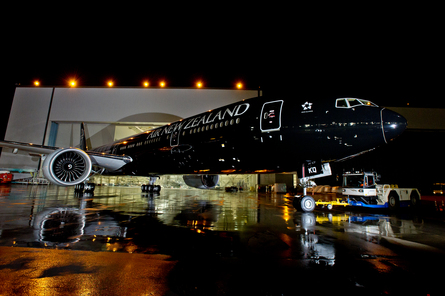Air New Zealand has converted options for two Boeing 787-9 aircraft, despite still being "hindered by the delay of the 787".
Speaking as he unveiled the airline's half-year accounts for the six months ending 31 December 2011, chief executive Rob Fyfe said Air New Zealand has converted two 787-9 options, bringing its orders for the type to 10.
The carrier has agreed on new contractual terms and a modified delivery schedule with Boeing and its first 787-9 is scheduled to arrive in the second quarter of 2014.
Fyfe said although the airline is benefiting from more efficient aircraft such as the Boeing 777-300ER, it is "still hindered by the delay of the 787".
He added: "Despite the extremely frustrating and costly delays, we strongly believe the 787-9 is the right aircraft for Air New Zealand and worth the wait."
Interim net profit for the half-year fell by 61% to NZ$38 million ($31.8 million), down from NZ$98 million in the corresponding period a year ago.
Normalised earnings before tax were at NZ$33 million, down by 71% against the same period a year ago, the carrier said. Under New Zealand reporting rules, normalised earnings exclude net gains or losses on derivatives.
Air New Zealand carried 0.6% fewer passengers in the half-year, compared with the corresponding period in 2010. RPKs declined by 2.6% and ASKs declined by 1.0%. Passenger load factor declined by 1.4 percentage points to 82.8%.

© Air New Zealand
"Acknowledging this disappointing result, we have already commenced a series of initiatives to improve the airline's profitability by more than $195 million per annum by [Fiscal Year 20]15 through a combination of cost reduction, improved efficiencies and revenue growth," said Fyfe.
"The price of jet fuel has doubled over the last three years, but a weak global economy is hindering our ability to pass on these higher fuel costs to passengers," added Fyfe. "Therefore, we have been moving quickly to adapt, to gain greater efficiencies and to develop into a stronger, more profitable business."
Other factors the carrier gave for the weak result were the continued weakness in the travel markets of Europe and Japan. It also expressed concerns about overcapacity in the industry.
The carrier will cut 441 jobs by the end of its current fiscal year, said Fyfe, adding that 266 involve the non-replacement of roles and the non-renewal of contracts, of which 193 have already been achieved. The carrier will begin consultations with the affected staff on the remaining 175 roles to be cut.
Source: Air Transport Intelligence news























